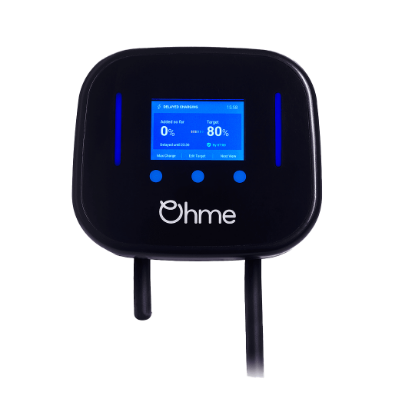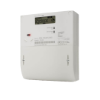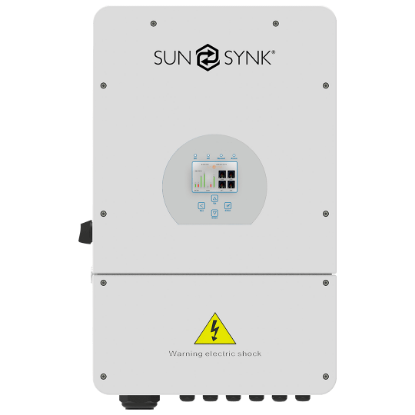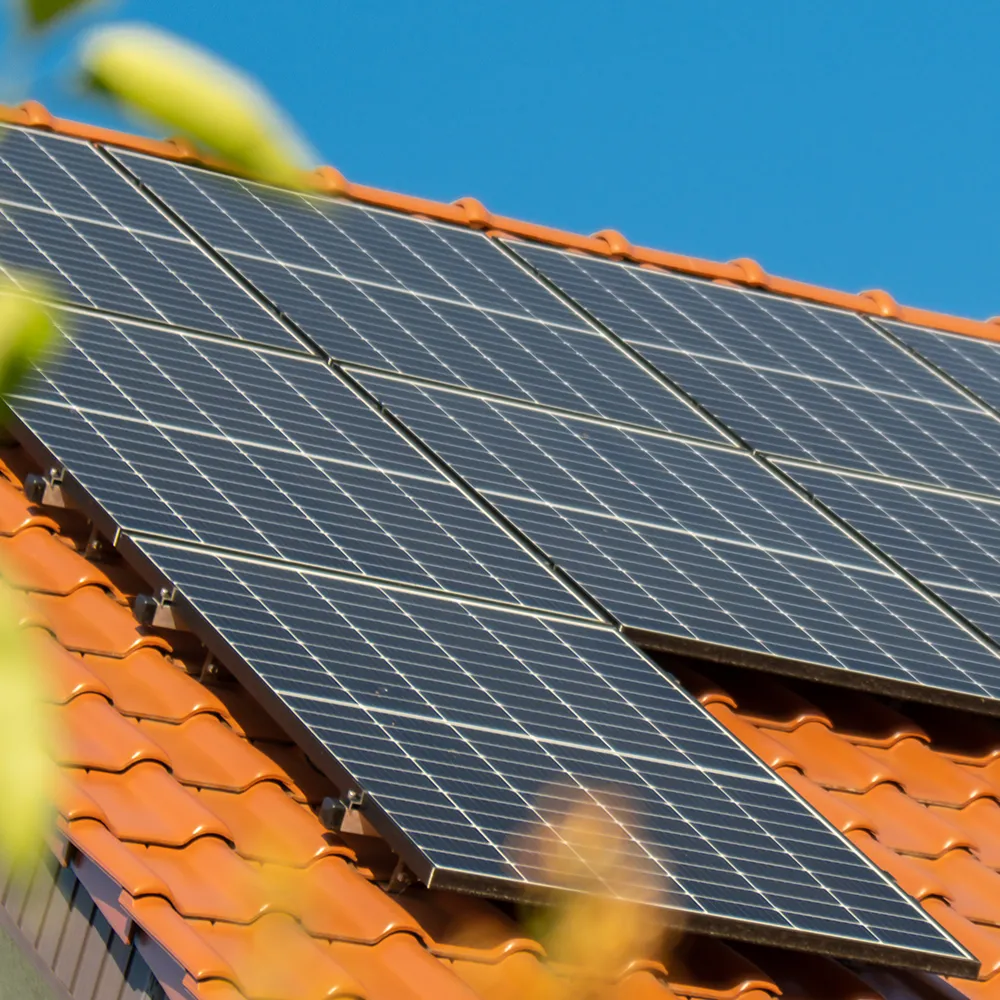Thinking about installing solar panels on your home? You’re not alone. With energy prices rising and the government offering 0% VAT on installations, more UK homeowners are choosing to generate their own electricity. But knowing which system is right for your property isn’t always straightforward.
In this guide, we’ll break down the key components of a domestic solar setup, how much you can expect to pay in 2025, and what factors to consider when choosing panels, inverters, and battery storage. Whether you’re looking to cut bills, reduce your carbon footprint, or become more energy independent, this article will help you make an informed decision.
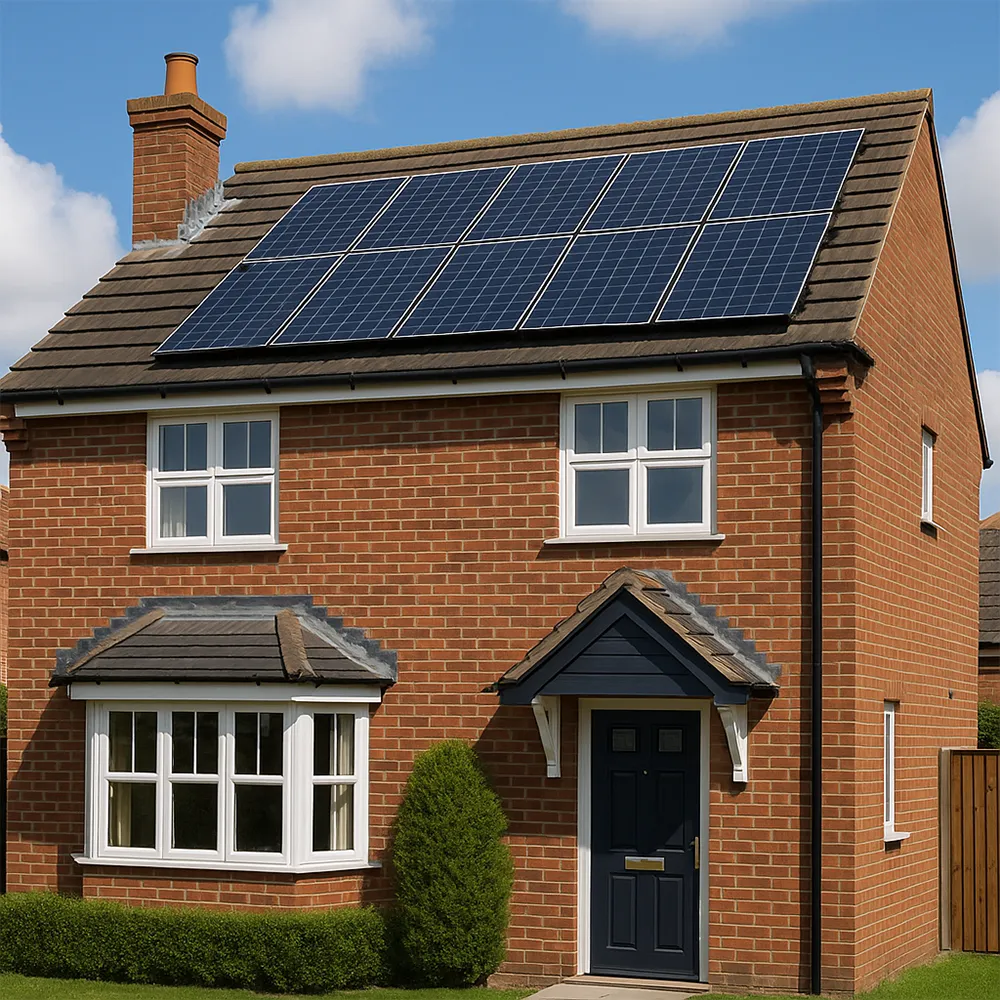
Why Install a Solar Panel System at Home?
Investing in solar isn’t just about going green it’s about taking control of your energy future. Here are the main reasons homeowners across the UK are making the switch:
Lower energy bills
Solar panels let you generate your own electricity during daylight hours, reducing how much you need to buy from the grid.Protect against rising costs
Lock in long-term savings by producing your own power. With unit rates increasing, solar is a smart hedge against price hikes.Cut your carbon footprint
Generating clean energy helps you reduce emissions and support the UK’s transition to net zero.Government support
Thanks to the 0% VAT relief and schemes like the SEG (Smart Export Guarantee), it’s never been a better time to install solar.
(Learn more about UK solar grants and funding.)
What is a Home Solar Panel System and How Does It Work?
A domestic solar setup is more than just panels on a roof. To generate, convert, store, and use your own electricity efficiently, you’ll need a combination of key components working together. Let’s break them down:
Solar Panels
These are the workhorses of your system converting sunlight into electricity.
Types of panels: Most UK homes use monocrystalline panels for their high efficiency and sleek look. Polycrystalline panels are slightly cheaper but less efficient, meaning you’d need more roof space to generate the same power.
Panel size and number: A typical 3-bedroom home might need a 4-5kW system, which usually equates to 10-15 panels. Your roof size, pitch, and shading will determine how many you can install.
Panel brands: Leading options include JA Solar, Jinko Solar and Aiko Solar all known for performance and warranty protection.
Explore the latest solar panel options at Evergy.
LEDVANCE 440W
Inverter
Solar panels produce DC electricity but your home runs on AC. That’s where an inverter comes in.
String inverters: Cost-effective and ideal for unshaded, south-facing roofs.
Hybrid inverters: Allow battery connection and enable smart energy management ideal for homes looking to add storage now or in future.
💡 Looking for a reliable hybrid model? The SolaX X1 3.7 kW G4 Hybrid inverter is a compact, efficient choice for UK homes.
Battery Storage (Optional)
A battery stores any excess energy your panels generate during the day so you can use it at night maximising your self-sufficiency.
Popular for families or high evening usage
Enables backup power during grid outages (model dependent)
Works especially well with smart tariffs like Octopus Flux
🔋 View our solar battery offerings.
Mounting Systems
These secure the panels to your roof and they’re more important than they might seem.
Pitched roof? Choose tile hooks or rails matched to your roof covering.
Flat roof? Use ballasted or angled frames for optimal tilt.
🛠️ See our full range of solar mounting systems for UK roof types.
(For a deeper dive into the technology and installation process, check out our guide on How Solar Panels Work - UK Guide to Installation & Savings, which explains PV systems in more detail.)
How Much Does a Domestic Solar System Cost in 2025?
The cost of a solar panel system in the UK varies depending on the size, equipment quality, and whether you include battery storage but it’s more affordable than ever, especially with 0% VAT still in place.
Here’s a rough guide to current installation prices in 2025:

Type of Panels & Installation Complexity
- Standard on-roof panels are the most affordable.
- Premium options like integrated solar tiles or sleek all-black panels cost more.
- Complex roofs (e.g. high or awkward access) can increase labour costs.
Add-ons & Upgrades
- Adding a solar battery: £5,000-£8,000 extra
- Smart energy controllers and EV charger integration add cost but boost efficiency.
- Tip: Evergy offers packages that include panels, inverters, and batteries.
Scaffolding & Roof Work
- Scaffolding is usually included in quotes.
- Roof repairs or reinforcements will add extra cost.
- Installing panels during roof renovations or new builds can reduce costs
0% VAT on domestic solar installations:
The UK government has made solar panels more affordable by cutting VAT to 0% (zero) for home solar installations, as part of a drive to boost renewable energy. This zero VAT rate is in place until March 2027, after which it’s scheduled to return to 5%. For now, this means you save 20% compared to the past - essentially, a £6,000 + VAT system that used to cost £7,200 would now be £6,000 flat. This tax break, combined with various energy bill savings, makes solar more financially attractive.
In summary, expect something in the mid four-figures to get a solar PV system for an average home. While the upfront cost is significant, remember that you’re purchasing equipment that will generate free electricity for 25+ years. In many cases, solar panels can save hundreds of pounds on electricity bills each year, meaning they gradually pay for themselves (more on the payback in a later section). Plus, any excess energy you sell earns you a bit of income via SEG, offsetting the cost over time.
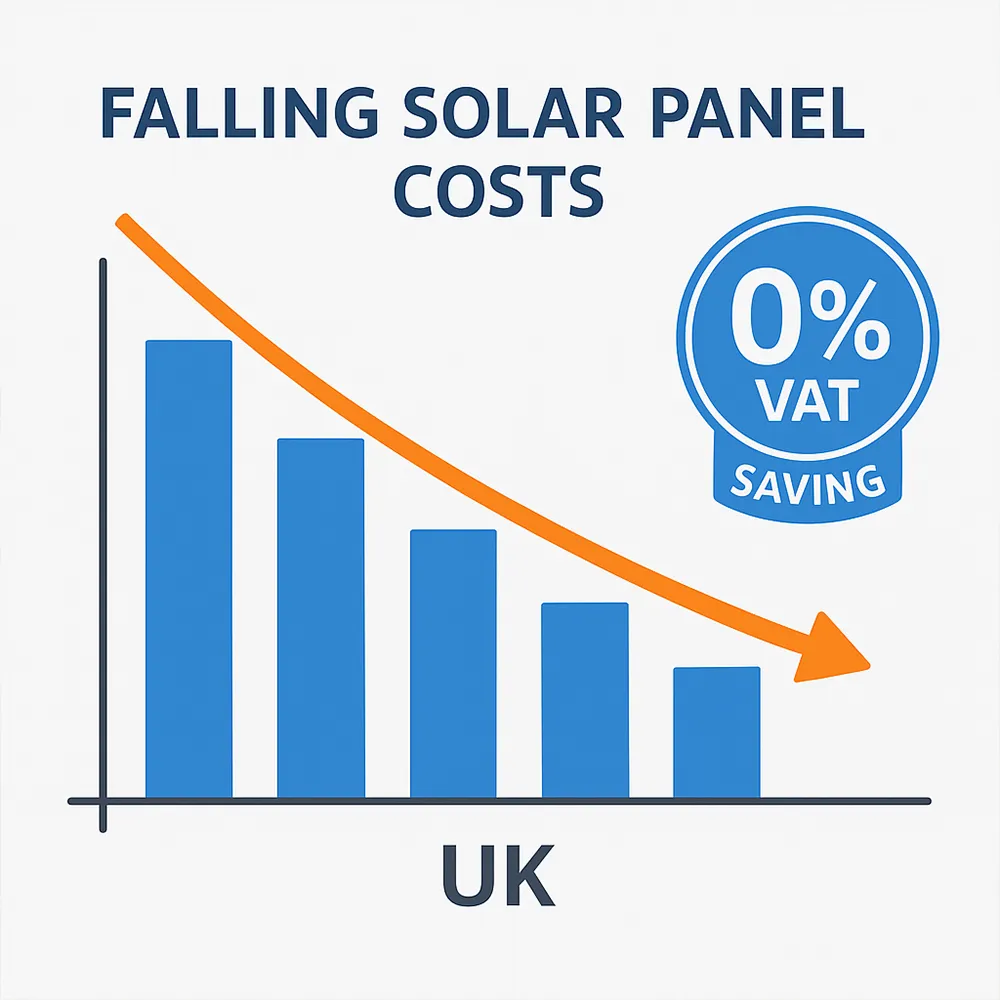
Are There Grants or Funding for Solar Panels in the UK (2025)?
While there’s no universal grant for solar panels in England or Wales, several schemes and incentives can still help reduce the cost:
Smart Export Guarantee (SEG)
Not a grant, but an ongoing incentive. Energy suppliers pay you for surplus electricity exported to the grid. Payments vary by supplier and can add up to a few hundred pounds a year.
ECO4 Scheme
Supports low-income or vulnerable households with energy upgrades. Solar panels may be included if you're eligible, especially when combined with electric heating or heat pumps. Check with your energy supplier or local authority.
Regional & Local Support
Scotland and some councils offer interest-free loans or group-buy discounts (e.g. Solar Together). Programmes like Warm Homes fund also support solar in social housing. Support for individual homeowners is more limited, but worth checking locally.
Green Finance Options
Some banks offer “green” loans or mortgages that help fund solar at lower interest rates. Improving your home’s EPC rating through solar may also unlock better mortgage deals.
Other Savings
All solar installations benefit from 0% VAT, which helps reduce the upfront cost.
Check out our dedicated post on Solar Panel Grants & Funding in the UK (2025) for a comprehensive look at ways to fund your solar project.

What’s the Best Solar Panel System for You?
The ideal solar panel system depends on your household’s energy usage, roof space, budget, and future plans (like EV charging or battery storage). Here’s how to match your setup to your lifestyle:
🏡 For the Average Family Home (3-4 Bedrooms)
Recommended system size: 4-6kW
Panel suggestion: Ledvance for high output and reliability
Inverter type: Hybrid (future-proofed for batteries)
Battery: 5-10kWh if usage is high during evenings or if you’re on an agile tariff
💡 Browse the latest Ledvance panels to get started.
🖥️ For Home Workers or High Daytime Usage
Recommended system size: 3-5kW
Panel suggestion: High-efficiency monocrystalline (e.g. Aiko Solar Neostar)
Inverter type: Standard or hybrid
Battery: Optional depends on daytime vs evening use
🌞 Panels like the Aiko Neostar 2S offer excellent performance even on cloudy UK days.
🚗 For EV Owners
Recommended system size: 6kW+
Panel suggestion: Large format panels (Jinko Solar N-Type)
Inverter type: Hybrid with battery compatibility
Battery: 10kWh+ to store energy for overnight vehicle charging
🔌 Pair with a Ohme charger or Easee One for solar integration.
🧓 For Downsizers or Low-Energy Households
Recommended system size: 2-3kW
Panel suggestion: Compact modules for small roofs
Inverter type: Simple string inverter
Battery: Usually not necessary
🛠️ Chat with Evergy’s team if your roof has shading or limited space we can design a bespoke setup.
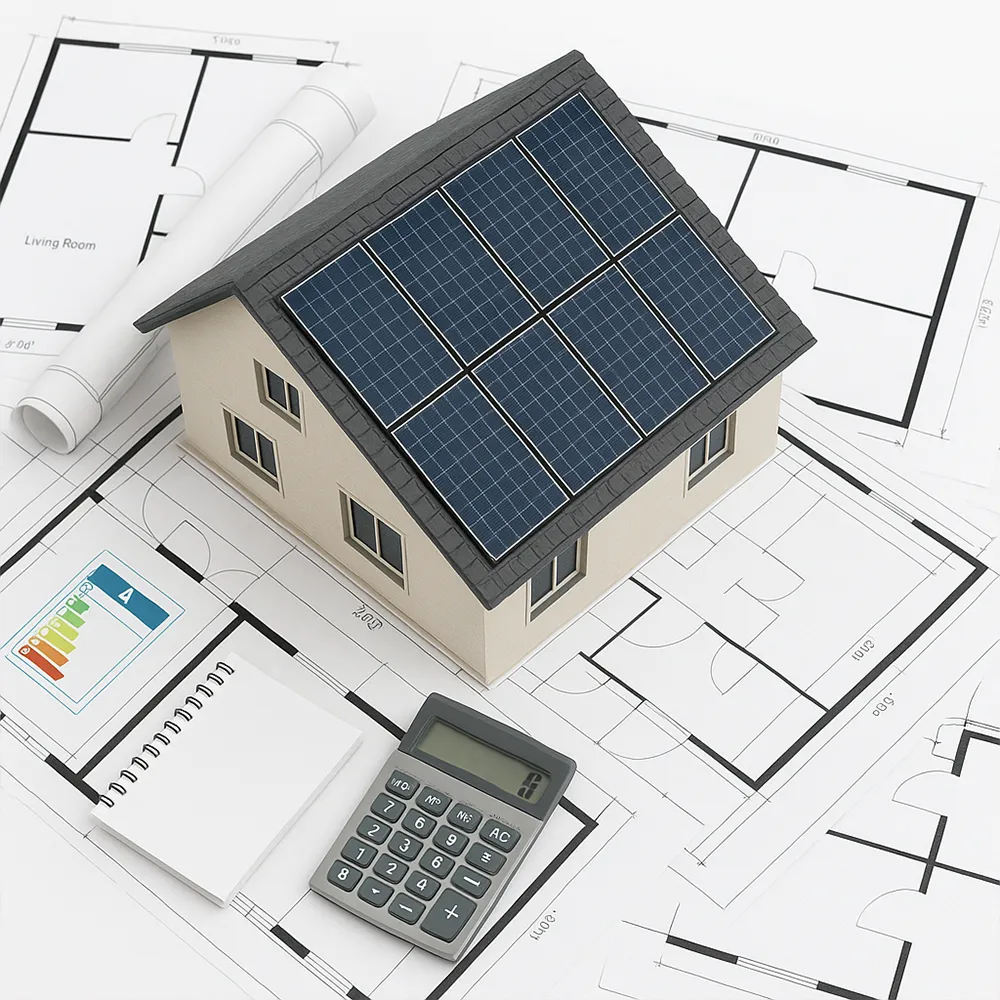
What Size Solar System Do You Need?
It all comes down to your energy use, roof space, and goals.
Let’s say you use around 4,000 kWh of electricity a year - that’s fairly typical for a UK household. If you’ve got a south-facing roof that can fit 12 panels, a 4 kW solar system would be a great fit. In much of England, this could generate roughly 3,400 kWh annually, covering up to 85% of your usage in summer and around 30% in winter - averaging out to about half your yearly demand.
No room for 12 panels? No problem.
Even a smaller 2 kW system (around 6 panels) could still produce 1,700 kWh per year - a meaningful contribution to your bills and carbon footprint.
On the flip side, if you have lots of roof space and higher usage - say 6,000 kWh annually, perhaps with an electric vehicle - a 5-6 kW system might be the smarter move.
Most installers will guide you through this process, often recommending a system size based on a site visit and your priorities. Want to maximise savings? Or maybe your focus is cutting emissions? They’ll help tailor the system to suit.
If you're still undecided, you can always start with a moderate system - just keep in mind it’s usually more cost-effective to install the full system at once. Also, remember that UK homes on a single-phase supply are typically limited to 3.68 kW per inverter phase without special approval, but that’s something a qualified installer (like us at Evergy) will take care of.
The bottom line? There’s no one-size-fits-all. The right system is the one that fits your home, your lifestyle, and your energy goals.
Is Solar Power Worth It in 2025?
Let’s tackle the big question: “Are solar panels really worth it?”
In 2025, for many UK homeowners, the answer is a confident yes. With rising energy bills, improved solar tech, and supportive incentives, solar power is more appealing than ever. Here's why:
1. Financial Payback and Bill Savings
Installing solar panels does come with an upfront cost, but the long-term savings can be substantial. Many UK households report electricity bill reductions of 50% or more, with some saying their costs “plummeted” after going solar.
- If you use a lot of daytime electricity - or install a battery to store your solar energy - you’ll benefit even more.
- Typical savings are in the range of a few hundred pounds per year.
- Most systems pay for themselves in 10 to 15 years, depending on location, usage, and setup.
- After that, you’re generating free electricity for the remaining 10+ years of the panels' life (they usually last 25+ years).
Even if your savings take longer to balance the initial cost - say 15+ years if you're out all day and export most of your energy - it's still a long-term win. Every unit you generate means one less you have to buy at fluctuating market rates, boosting your energy independence.
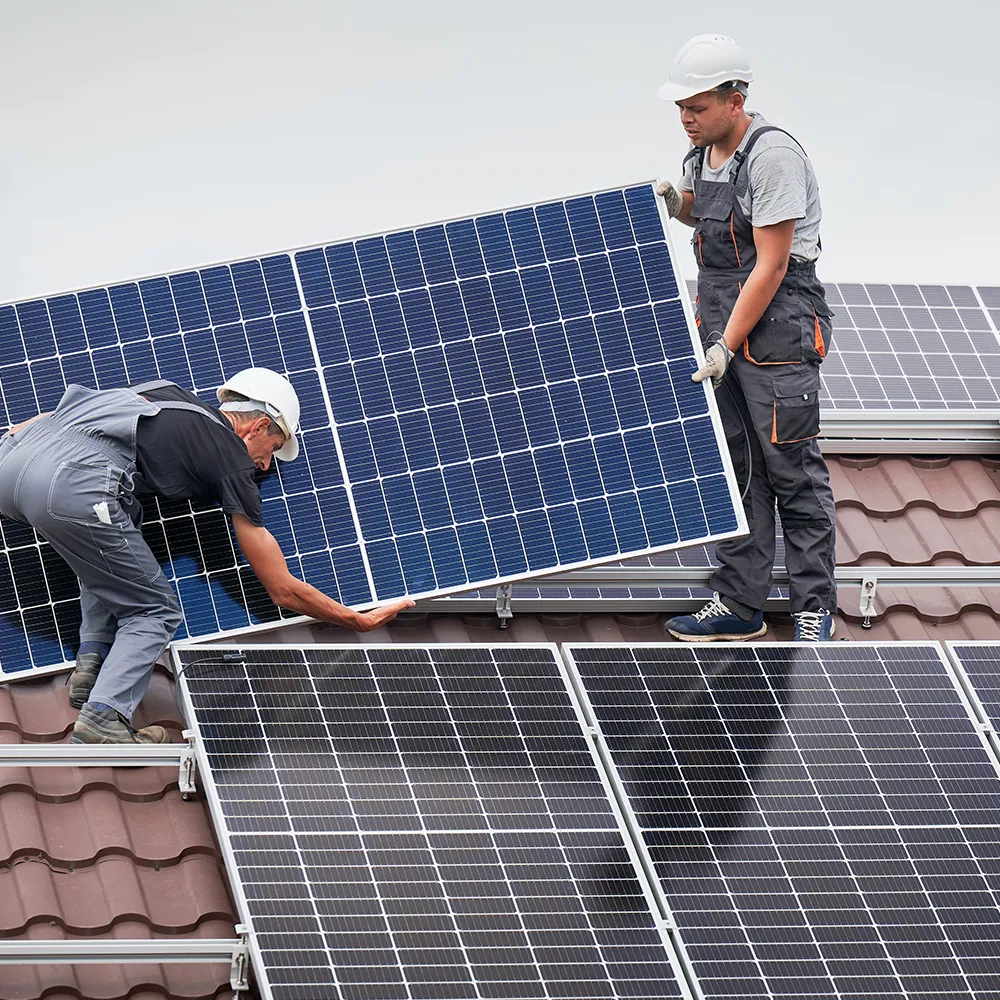
2. Protection Against Rising Energy Prices
UK energy prices have been volatile and steadily rising in recent years - a trend that isn’t expected to reverse any time soon.
Solar panels act as a hedge, helping you take control of your energy costs.
With the Smart Export Guarantee (SEG), you get paid for excess electricity you feed back to the grid - not huge amounts, but it adds up.
And thanks to 0% VAT on solar installations, the upfront costs are lower now than in previous years.
3. Environmental Impact
Beyond the savings, solar panels are one of the most effective green upgrades you can make.
A typical system can cut around 1.3 to 1.6 tonnes of CO₂ emissions annually - the equivalent of taking a car off the road or planting dozens of trees.
Over the decades, that’s a major reduction in your carbon footprint.
Many homeowners cite the environmental benefits as just as important as the financial ones - it’s a powerful way to contribute to a cleaner planet from your own rooftop.
4. Reliability and Low Maintenance
Solar PV systems are impressively low-maintenance:
No moving parts means very little can go wrong.
Occasional cleaning might help - though UK rain often does the job.
Inverters may need servicing or replacement after 10-15 years.
Battery systems (if installed) also have defined lifespans, but technology is improving fast.
Most panels are built to last 25 years or more and come with long performance warranties.
In short, solar is largely a “fit-and-forget” system that delivers peace of mind for decades.
5. Home Value and Lifestyle Perks
Solar can enhance your home's value and appeal to buyers, especially with the push toward energy efficiency.
It may boost your EPC rating, making your home more attractive.
While resale value gains might not fully match your upfront spend, it still contributes positively.
Solar is also a gateway to smarter living - using appliances on timers, syncing with smart plugs, or charging an EV using solar energy.
This lifestyle shift helps you get more from every kilowatt you generate.
So, Is It Worth It?
For most people who plan to stay in their home for a while, yes - absolutely. You’ll likely save money, reduce your carbon footprint, and protect yourself from rising bills.
That said, solar isn’t for everyone. If your roof is heavily shaded or you’re planning to move soon, it might not be the right time. But with zero VAT, SEG payments, and increasing urgency to go green, solar in 2025 is one of the smartest home upgrades you can make.
You’ll save money and the planet a rare win-win.
(For detailed payback examples and cost breakdowns, check out our in-depth blog: Are Solar Panels Worth It in the UK (2025)?)

Ready to Harness the Sun?
A home solar panel system is an investment that turns sunshine into tangible benefits: lower energy bills, protection from price hikes, a greener footprint, and even a potential boost in property value. We hope this UK-focused guide has made the concept of solar panels for your home simple and clear. From understanding how a solar PV system works, to knowing the costs and choosing the right size, to appreciating the long-term rewards - it’s clear that solar power has a bright future in 2025 and beyond.
If you’re feeling inspired to take the next step, why not explore what solar could do for your home? Every home is different, and that’s where we come in. Evergy is here to help you plan and install the ideal solar panel system tailored to your needs. We offer everything from high-performance solar panels and inverters to batteries and professional installation services. Get in touch with us for a free, no-obligation consultation - we’re happy to answer questions and guide you through the process.
Ready to harness the sun and start saving? Contact Evergy today and let’s make your home part of the solar revolution. You’ll be joining over a million UK homeowners who are already enjoying cleaner, cheaper energy from their own rooftops. Let’s shine on with solar!









